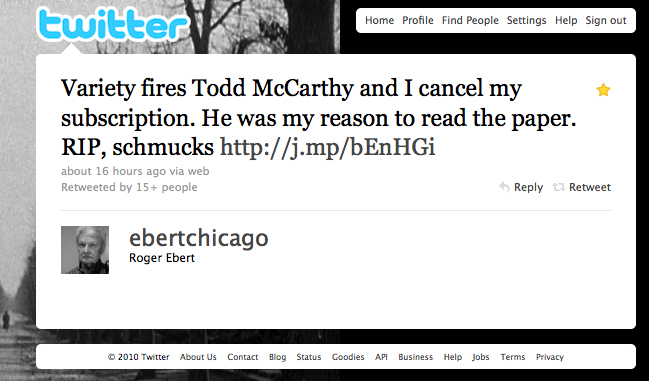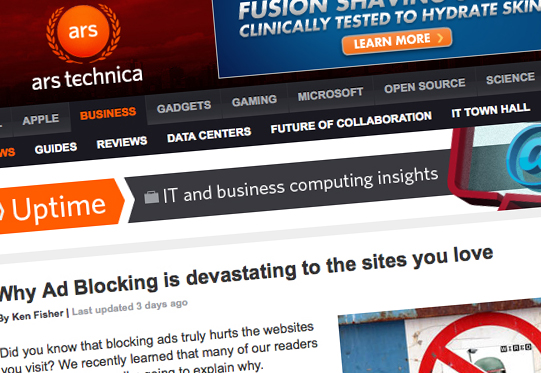It’s the end of something at Variety, and Roger Ebert isn’t happy
The biggest media news from the other side of the pond this morning was the laying off of two of Variety’s marquee critics. Chief film critic Todd McCarthy and chief theatre critic David Rooney were let go amid staff cuts that will see the magazine feature freelance reviews only.
The NYT have the full story here, and PoynterOnline have the staff memo, in which editor Tim Gray seems happy to offend exiting colleagues and readers alike with statements like: “Today’s changes won’t be noticed by readers.”
“It’s the end of something, I don’t know what” said McCarthy. The first thing that springs to mind is: your staff job at Variety, Mr. McCarthy. But he may have had Roger Ebert’s subscription to the magazine in mind:
No reprieve on death row interview policy
From Associated Press, news that the Supreme Court has decided against any changes to the federal prison policy preventing death-row inmates giving interviews to journalists.
The decision was prompted by an appeal from David Paul Hammer, an inmate in Terre Haute, Indiana. Hammer claimed that the policy, which came into effect after the Oklahoma City bombing, violated his constitutional right to free speech.
Twenty-three media organisations urged the Supreme Court to hear Hammer’s case.
Ars Technica and its readers kiss and make up after ad-blocking stand-off
An interesting development in the use of ad-blocking software was played out over the weekend by technology site Ars Technica and its not-so-faithful followers. (Nieman Journalism Lab)
After discovering that a shockingly high 40 per cent of their online readership were using ad-blocking software, which removes advertisements from web-pages, the site hit back. All of a sudden, those using the ad-blocking plug-in were unable to see the site’s content, with no explanation.
The quite amazing outcome is that, after publishing a post on the site explaining the damage that ad-blocking software meant for their revenue, and explaining why they had to take the counter-measures, editor-in-chief Ken Fisher received around 1,200 emails from people who had whitelisted the site, preventing its ads from being blocked. Furthermore, 25,000 people went on to whitelist it within 24 hours and 200 people subscribed, paying for the ad-free version.
It seems that the key in this case was communication, getting the message out to an essentially appreciative readership that using ad-blocking software can have seriously detrimental effect on content that you enjoy.
And, it seems like it worked. Good for Ars Technica.
An error within and error within and error within an..hold on what?
Finally, FishbowlDC shows everyone else a clean pair of heels in the competition for today’s strangest blog post, which reports in a round about way that the blog Regret the Error made an error reporting on an error made by Wolf Blitzer.
I can’t find an error in the Fishbowl post, which it rightly points out would constitute an error within an error within an error, but as that would also constitute even less of a story than the current one, it’s probably for the best.


With Ars Technica the problems are more fundamental.
There is an implicit assumption that advertising in its current format will continue as it has always done. In other words an industrial-age concept of billboards can be successfully grafted onto the information superhighway.
This is working at the moment only because an information age alternative has not yet emerged where vendors can meet with consumers in a more efficient, less intrusive and more cost-effective environment.
Information age advertising mediums are inevitable and are starting to appear right now. One example is the Customer Satisfaction Monitor which has recently been launched.
This Customer Satisfaction Monitor (http://www.customersatisfactionmonitor.com) answers the three most important pre-purchase questions and introduces a new step into the sales process. Advertisers can now target prospects at a very crucial point in the sales process much more cost-effectively and less intrusively because the consumer is in control.
As an advertiser it will be increasingly uneconomical to advertise elsewhere because potential customers will be ambushed by competitors at services like the Customer Satisfaction Monitor. Industrial-age advertising will, as a result, wither on the vine.
For those services relying on advertising it is time to rethink your revenue model.